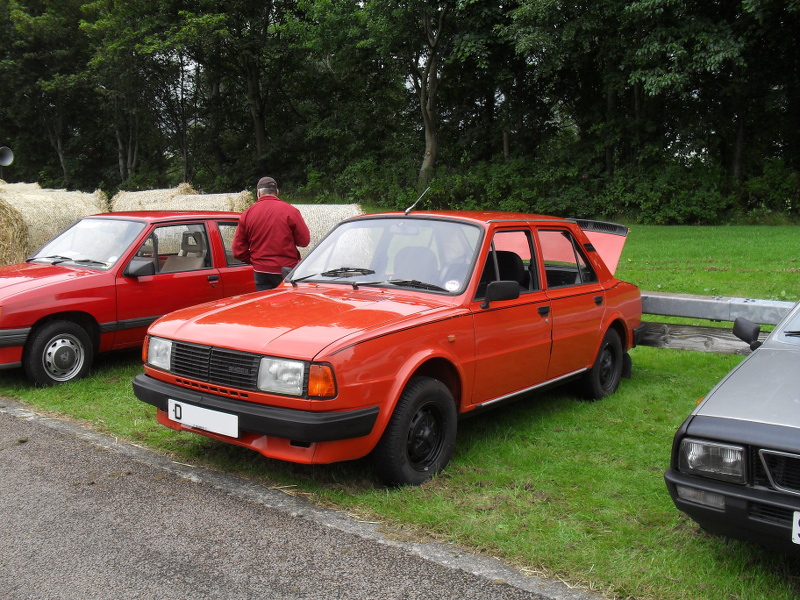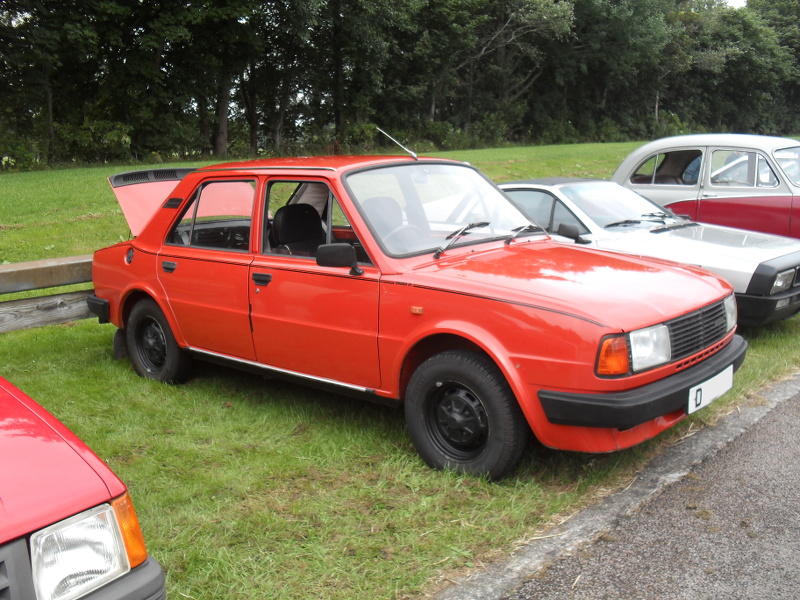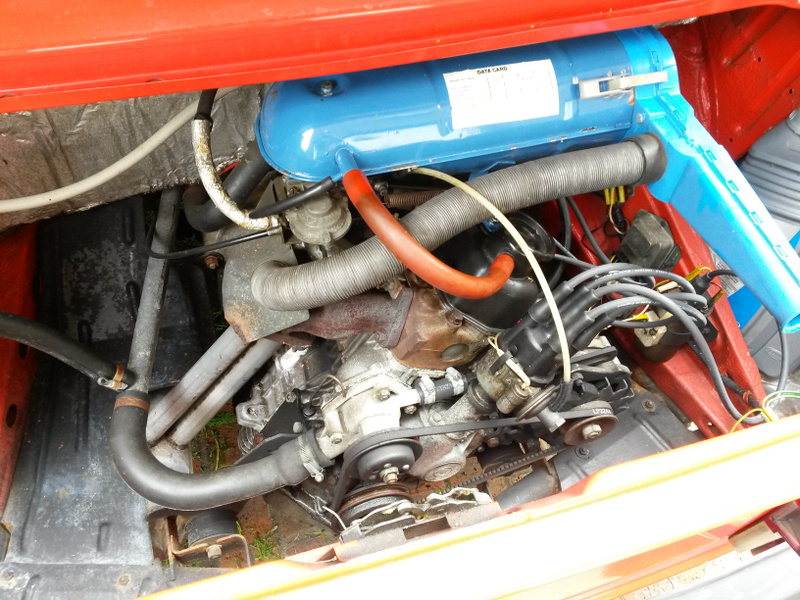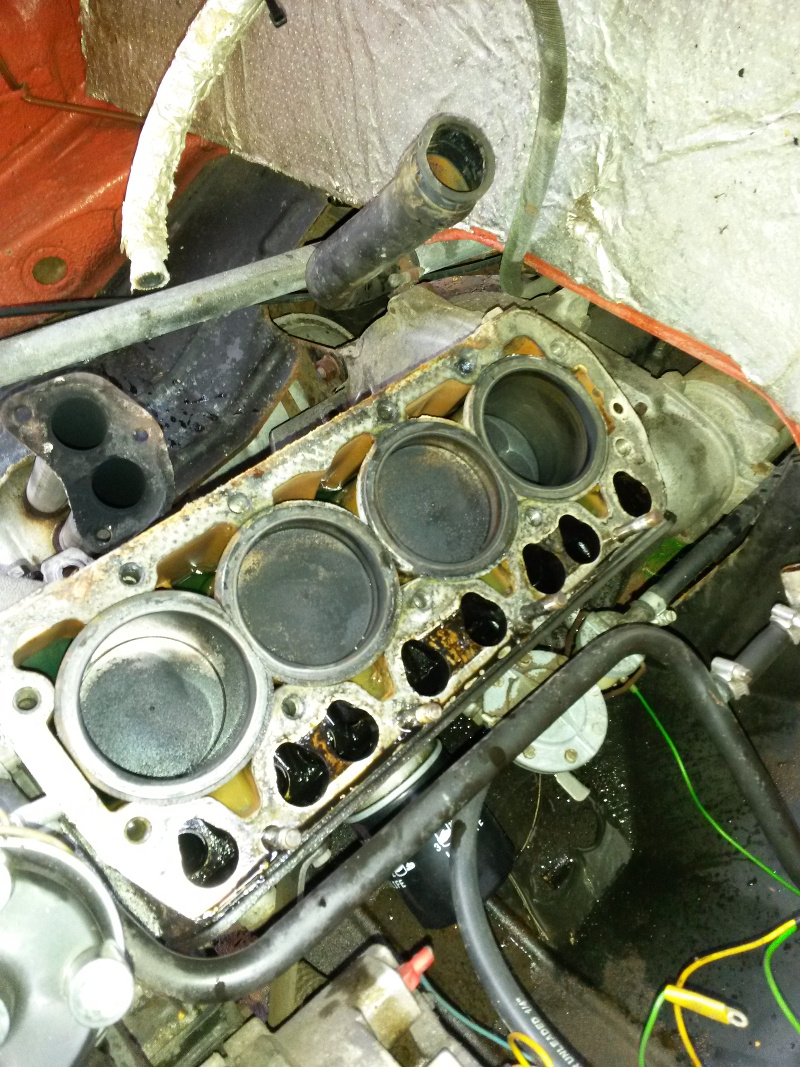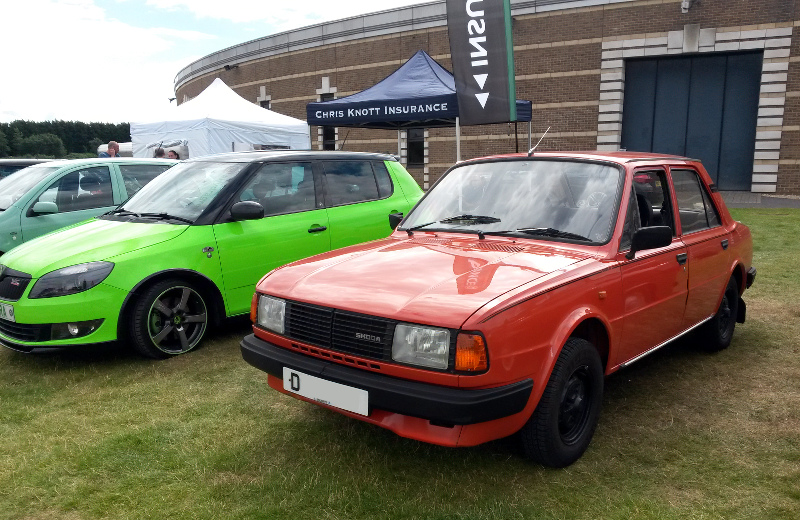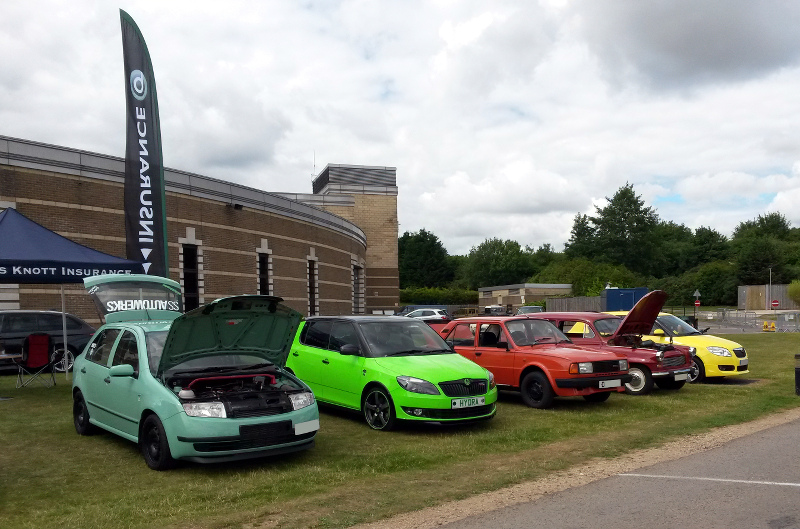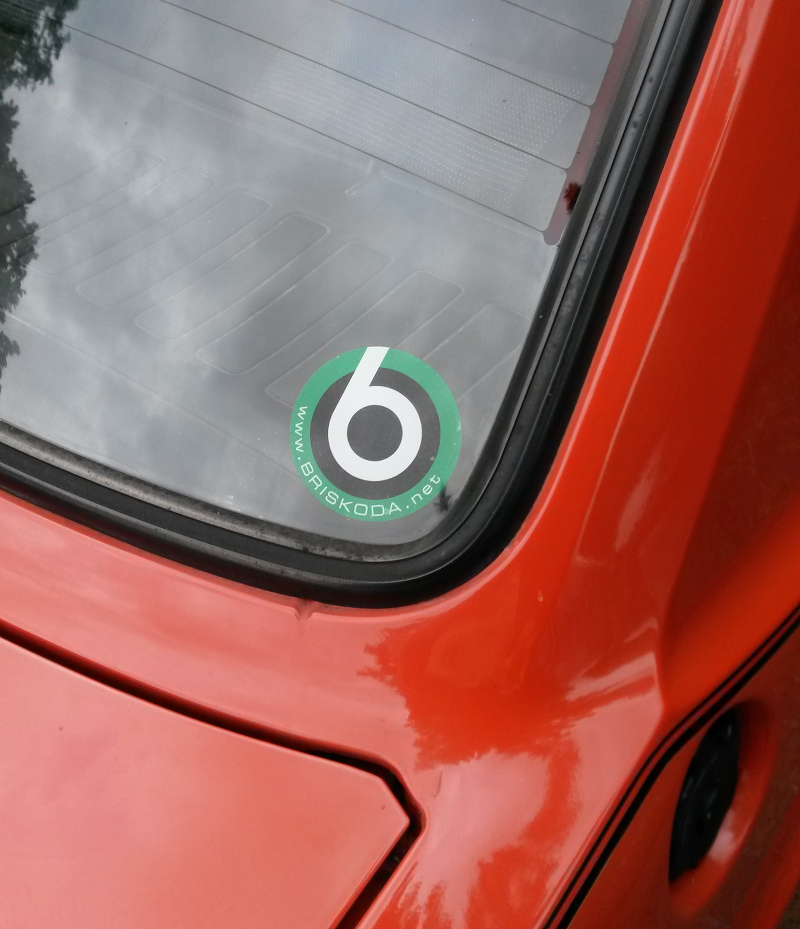
Anyone who's followed my site for a few years will know that I've always had a massive soft spot for the rear engined Skodas. This started back when I was about 12 years old when a friend of mine introduced me to a khaki green, basically derelict 120L-5 in their yard. This then resulted in a few years later me picking up my first Estelle, an E plate 130GL. That was a very tidy car and was entirely rust free, but it met an unfortunate end in 2005 when the driver of a diesel tanker failed to stop at a crossroads, resulting in me careering into the side of his cab at 50 odd mph. The driver's excuse was that he didn't see me. We were both okay, but it was the end of my first Skoda. A few years later, a 135RiC joined the fleet, and proved to be quite the problem child seeming to need attention every other week, eventually immobilising itself when the gear linkage snapped, at which point I lost patience with it and reverted back to Saabs for a while. Despite that, I did miss the charm of the old Estelles. I did on a few occasions consider picking up another one, but being based in Aberdeen at the time was generally put off by the fact that when they did appear for sale, they tended to be at the other end of the country and I simply didn't have the patience to deal with the logistics of buying an unseen car and getting myself to the other end of the country etc.
Towards the end of 2013 however something rather unusual happened. A classified ad appeared on eBay for an Estelle that was (relatively) local to me. It was definitely at the upper end of the price range you would have expected to pay for an Estelle at the time (from memory £1995), but being only a couple of hours drive away I figured was probably worth a bit of a premium. Plus it was a low mileage car and in a decent colour.
...This ad I might add was pointed out to me by the same friend who originally introduced me to these cars, and has a tendency to point these things out to me, this being I think the third car that I've ended up buying thanks to his "hey, have you seen this?" emails...You know who you are, and please keep it up.
After a bit of deliberation, the deal was done and we were on our way back from Inverness with my partner in the Saab following behind me in the Estelle. We did have one "interruption in progress" roughly halfway home when the cooling system of the Estelle lost interest in containing its coolant and I had to pull over in a very stereotypical cloud of steam when the temperature gauge started to head skywards. I had my suspicions about the condition of the expansion bottle cap before we left as the system didn't seem to be running up to pressure, so this wasn't a huge surprise. Total delay was only ten minutes or so as a helpful member of the public kindly donated us water to top the system up, and a ten litre container to take with us in case of further problems. The rest of the trip though was thankfully uneventful.
A few photos follow which show the car as it was when we first got it home.
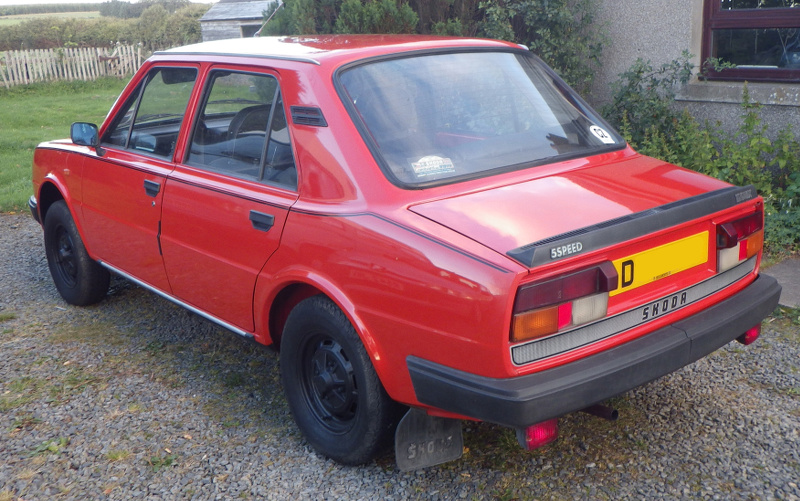

You can quite clearly see here the evidence from when the cooling system decided to spew its contents everywhere - this actually proved a lot more difficult crud to remove than I had expected, especially where the heat from the exhaust underneath had baked it onto the splash guard.
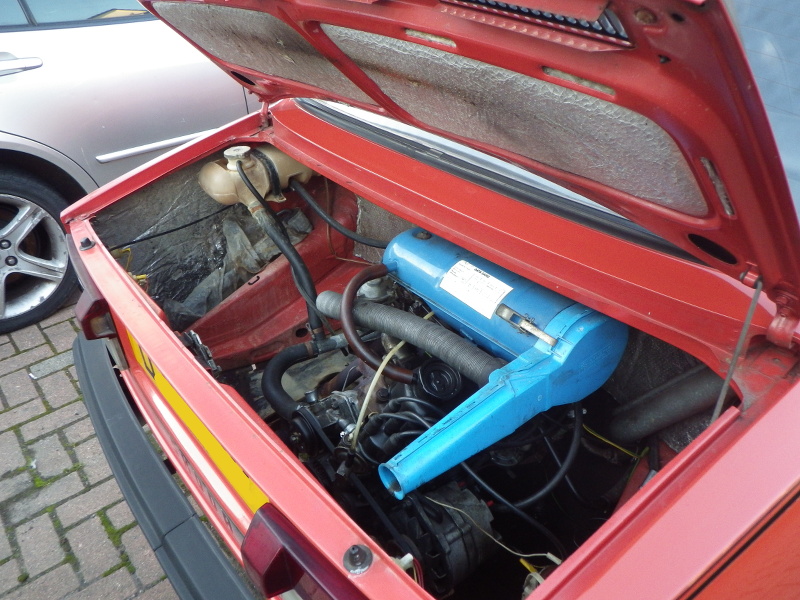
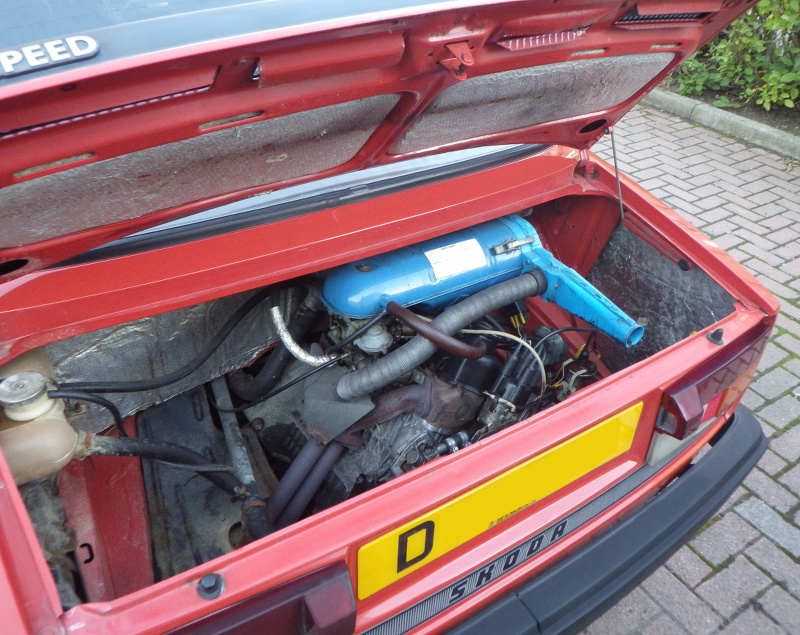
The interior is pretty much perfect, the only exception being the seats which have started to disintegrate along the seams as the seats in virtually all Skodas of this era have. This appears to be due to the fabric used being prone to breaking down at the chemical level when exposed to UV for any extended period of time. The clutch pedal rubber cap appeared in the driver's door pocket soon after this photo was taken. It appears that the clutch master cylinder has failed in the past and the clutch fluid had dissolved the adhesive holding it on. The actual leak had been solved long before I got the car, and it was a matter of seconds to clean the pedal up and reattach the rubber cap.

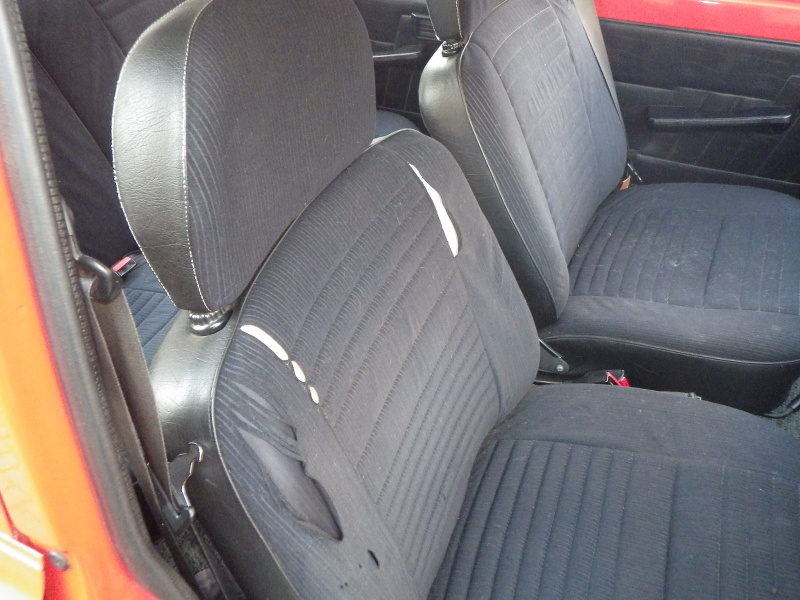

The first thing almost anyone notices when opening the door of this car is the really distinctive smell that this car has. Ladas, Saabs and Vauxhalls of a similar era are the cars which I recall having similarly distinctive scents, probably down to the type of the plastics used for the interior trim panels.
I think the bright orange strips of metal along the tops of the doors actually looks really good with the otherwise black and grey interior, adding a nice splash of colour.
Despite being such a basic (and cheap) car at the time, it's actually surprisingly comfortable. Rear legroom isn't massive (but it's not a particularly big car by today's standards), but the front is pretty good and the seats are pretty soft. I find that's quite a pleasant surprise these days when all manufacturers seem insistent on making their seats out of concrete.
One thing which I noticed immediately was that the previous owner had taken an "interesting" approach to getting the car through its MOT when it was identified that the brake warning light on the dash was lit. This solution was to cover the offending light in what appears to be black paint.
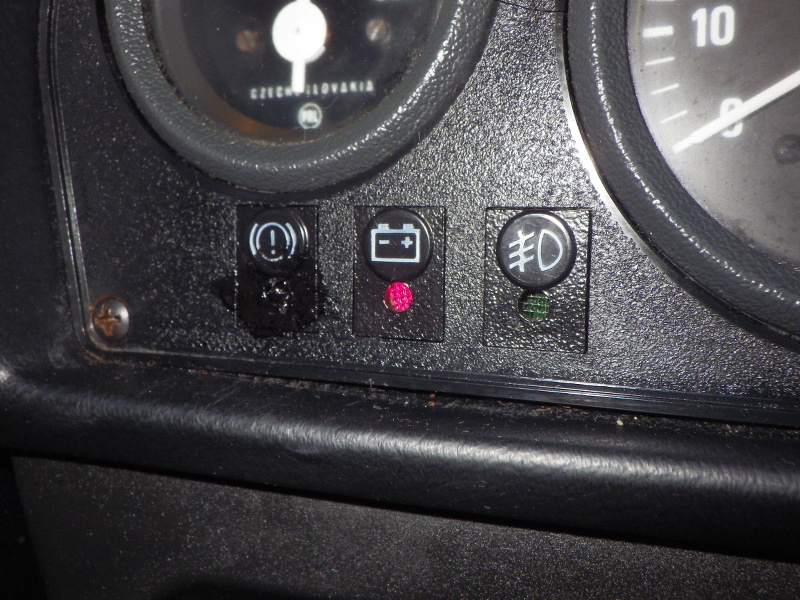
The reason this was lit was down to the brake pedal travel limit switch having been activated in the past (probably when the master cylinder failed in the past which it reportedly did). This puts the light on, and is reset (of course after identifying the problem) simply by pushing a button on the pedal support. Sadly the previous owner apparently didn't know this, and instead left me with quite a mess to clear up! I've managed to get rid of most of the gunk now, but it's still far from perfect. If anyone out there has a clean brake warning light "module" of this type (I only need the lens and emblem part, the lampholder and back piece are fine) that they'd be willing to part with, I would love to hear from you as this is seriously bugging my sense of OCD.
That was basically the start of the bug fixing. While it was a very low mileage car due to having spent most of its life static in a private collection, it had never really been properly recommissioned. The bare minimum had been done in terms of replacing actually failed brake components and a couple of fuel lines, but that was pretty much it. The car was even still wearing its original Uniroyal tyres when I got it - which were providing frankly terrifyingly low levels of grip and were changed within a week of getting the car. Going around roundabouts before then at anything over 10mph resulted in rear end drift and squealing noises that you would expect from an 80s US cop show car chase! You know that something is far, far wrong when you can easily invoke a powerslide while rounding any corner on a dry road in a vehicle with all of 54bhp on tap. When the original tyres were taken off, it became apparent that they had basically turned to plastic. Dropping one from waist height (where you would usually expect a tyre to bounce quite a decent distance) simply resulted in a dull "thud" and the tyre stopping dead on contact with the ground. With some new rubber (Pirelli P3000s) on the wheels though (155 SR13 tyres aren't exactly common these days, and I had to have these shipped over from Germany), both the ride and handling became far more civilised. Immediately the wonderfully lively steering feel I remembered from my first Estelle returned, and the tendency to wander in sidewinds without ballast in the luggage compartment was changed from "almost undriveable" to "only mildly terrifying."
Also high on the list of things to sort (though not so high as the tyres!) was the fact that the car would not idle for love nor money, making city driving a somewhat taxing affair requiring masses of forward planning and three feet. Not ideal given that at the time I was living literally smack in the middle of Aberdeen. I'm not entirely sure which of the following items where actually to blame for that, or if it was a combination effort, but a quick check over revealed the following problems.
1. A carburettor with a float bowl full of silt.
2. ...And jets to match.
3. The ignition timing was waaaaay advanced, which also explained the horrible pinking on hills.
4. Every vacuum line save for the one to the brake servo was perished beyond usefulness.
5. The fuel lines were all so perished I'm surprised the engine was getting any fuel whatsoever.
6. The distributor cap looked like something dredged off the Titanic, the rotor arm to match it.
7. The points were so tight that they were barely opening at all.
8. The HT leads were the originals and were knackered (as I discovered while finally adjusting the idle air mixture screw after sorting all of the above, when I got a terrific belt off one of them).
While changing the above, it was found that virtually every water pipe was original as well and were badly perished (though astonishingly not actually leaking), so they were replaced on the spot. Especially the balancing pipe between the heater hoses which is that horrible green fabric braided hose that Skoda loved back then which usually decomposes to powder when you even look at it. The heater core and radiator bleed hose is usually made of this as well, but in my case that one had already been replaced.
That basically got the car to a condition whereby it drove reasonably well, and would actually idle properly. Suffice to say that made general day to day progress rather less stressful. The one problem which still persisted though was the tendency for the car to boil when climbing a long gradient, despite no shortage of coolant, a radiator that was flowing reasonably well and a properly bled system. This was always curable simply by switching the engine off for five minutes or so, and once restarted normality would be restored. The cause for this was pretty quickly traced to a dodgy pressure cap on the expansion bottle meaning that the system wasn't holding pressure. This allowed the water to flash boil when passing through the hotter parts of the engine, cavitating in the water pump and resulting in coolant flow stopping. A new cap on the tank from eBay sorted that out straight away.
It however did then identify another problem, that the head gasket is blown between one of the cylinders and the water jacket. If you don't depressurise the cooling system after the engine has been run (it's not over-pressurising at all), cylinder no 1 will take several seconds to fire when the engine is next started due to water contamination. This obviously needs to be sorted out properly in due course, and I hope to get it done this summer (the Saab is currently being recommissioned and its list of gremlins attacked, after which I'll turn my attention to the Skoda's head). These heads are very prone to warping if overheated, so I fully expect to have to get it skimmed. Really annoying though that this has probably been caused by the previous owner failing to change something as simple as a coolant expansion cap, as I'm sure that this was the root cause for the blown head gasket! I'm also hoping to have access to my garage again in the next couple of months which will make life far easier than trying to do this work on the driveway.
The other things on the wish list at the moment are a fresh set of brake discs (they are currently the originals, and having spent so many years sitting around hasn't done them any favours), and new rubber bushes for the rear suspension as they have as you would expect started to perish quite badly, throwing the camber out at the back (it effectively allows the suspension arm to rotate), especially on the offside.
As it is though, the car nowadays does relatively few miles to local duties and to shows. It is *regularly* used though which is the main thing to keep a lot of problems at bay!
If you're in the Milton Keynes area, you may well see it out and about - it's not exactly easy to miss. Hoping that it will be appearing at quite a few of the shows in that area this year, so feel free to say hello. I don't bite!
The Skoda 120LX is a bit of an oddball in the model range, and I'm honestly not totally sure how it came to be. The best way to describe it really is "A Skoda 130 with a 120 engine." Meaning that it had the semi-trailing arm rear suspension, rev counter and headrests that were normally seen on the 130, but had the 1174cc engine that would normally be in the 120. Theories which spring to mind for me are that they ran short of 130 engines, or over-stocked the 130 spec rear suspension. We'll probably never know for certain!
This particular car is one of a pretty limited number of special edition cars that were made (read: branded by the importer!) to commemorate Skoda's 21st year of trading in the UK. When new the car would have come with a signed, numbered certificate of authenticity from the importer, a set of crystal wine glasses, and features graphics on the front wings stating "Skoda 21" as can be seen below. Otherwise the car is unchanged from standard. I don't know how many of these 21st Anniversary cars there were unfortunately or where mine stood in the sequence.

Next we have a selection of random photos of the car before we drop into the current day "blog" section showing things as they progress...Let's face it though, it's the pictures that most people are here for...
One of the oddities of the UK spec cars is that the headlight indicator light on the dash isn't used. It's there, it's wired up, but no lamp is fitted. I figure that it's actually a useful one to have, so stuck a lamp in there (nicked ironically from the front fog light indicator - which is NOT fitted in this car...but has a lamp fitted in its indicator!), and sure enough that now works.
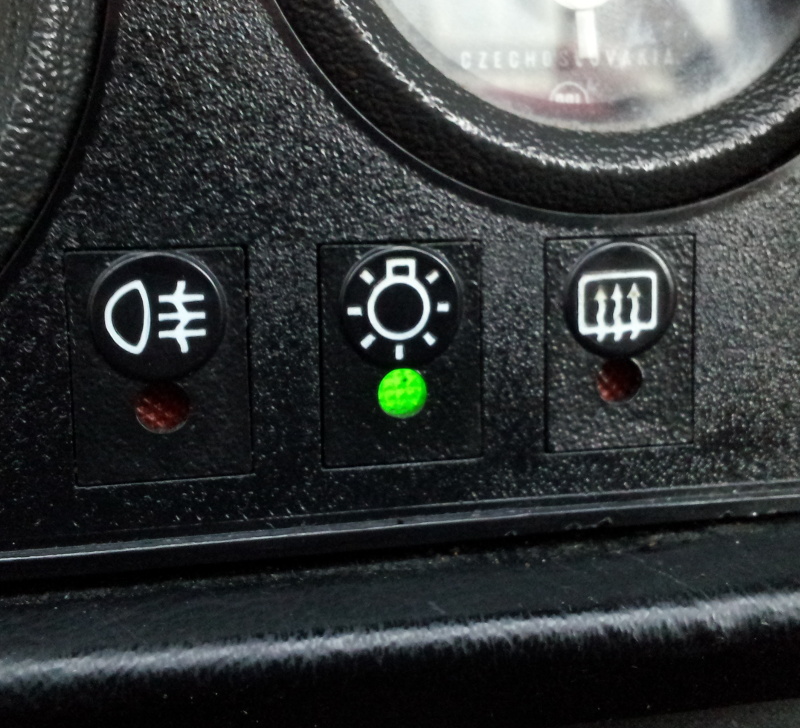
...unfortunately while I was doing this, I managed to dislodge the illumination lamp from the fuel gauge, so need to go back in there at some point to stuff it back into the back of the gauge. Oops.
Next few are just some general shots showing what I consider to be interesting general lines, details etc of the car.
In case you wondered, the little "knobbly bit" (as my mother described it) in the tail lights is actually the illumination lamp for the rear number plate.
